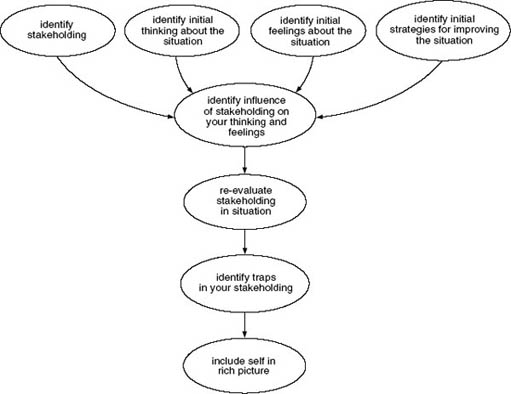8 Part 2: 4 Being inside complexity
8.1 Loose ends
Before moving into a discussion of the missing element of the rich picture, I want to direct your attention to all the thoughts and ideas I have encouraged you not to put into your rich picture. I imagine you might have collected quite a list of loose ends. The next activity will involve some of these.
Expect to take about half an hour to do the next activity.
Activity 13
Identify and record any stake you hold in this situation in your Learning Journal.
First, identify any stake you hold in the situation described in the case study. Such a stakeholding might arise in any one of a number of ways.
Are you a lone parent, a parent who lives (or has lived) away from your children, or a parent with sole (or most) care of your children (or child)? Are you a child of a single-parent family? Do you have professional or other interests in the Child Support Agency; the Benefits Agency; or charitable or campaigning organisations working in these areas? Do you have a role in an equivalent agency outside the UK? Do you have any role in forming government or political policy? Do you subscribe, through membership or otherwise, to a political-party view on these issues? Do you have family members, friends, neighbours or colleagues, in any of these roles? Perhaps you have a stake as a tax-payer.
Record your current thinking about this situation.
In particular, record any ideas about what the core issues are, people or agencies that you might hold responsible for some of the problems described in the case study, areas where you feel clarity is missing, and so on. Are there places where you feel tempted to say things like, ‘if we could just deal with X then Y might be better’.
What passages of the case study seem to represent particular clarity or do you particularly identify with?
Make notes on your own view of the extent of parents’ rights and responsibilities with respect to their children, and the role the state should have, if any, in ensuring that children are adequately supported.
Record your current feelings about this situation.
Are you angry? cynical? amused? amazed? Do you have any feelings on behalf of any of the protagonists? Do you feel it's not fair? (Be specific about what's not fair, not fair to whom.) Do you have any positive emotions? Do you feel compassion (for whom?), empathy, approval (of what?), pleasure?
It's easy to censor feelings, especially perhaps in the rational activity of studying a unit. The censorship arises from the idea that irrational emotions have no place in rational discussions or from, for example, the desire to avoid passing judgement on someone else's behaviour or attitudes.
Feelings are not necessarily politically correct either. While political correctness can challenge us to examine the basis of our feelings, gut reactions are generally not guided by intellectual principles. Get past this censor as much as you can.
Another block to recognising feelings is the idea the feelings have to be justified in some way. You don't have to do this in this context. You should simply record the emotions that are there. Be as specific as you can about what you feel.
If you have no direct stake in the UK's arrangements for child support, perhaps because you live outside the UK, record your feelings and questions about the situation described. Include your impressions about the social arrangements that give rise to the situation described. Include also, any judgements you make about these. Does the text give rise to any questions concerning arrangements and social conditions in the country where you live?
If you pay taxes in the UK, or live in a household that pays taxes, what are your feelings about the situation as a tax-payer?
Record your initial views about what should be done to improve this situation.
Don't worry if these are based on gut reactions. Any ideas you have about what should be done, or about what you feel should be explored, should be recorded. They may be more or less feasible, or more or less long-term. Use the language that first springs to mind, even if it's in the form of, for example, ‘A and B need their heads banging together’, or even, ‘people should be stopped from having babies’.
In particular, if you have any ideas that take the form ‘X could …’, ‘X should …’, or ‘X ought to …’, record them because these word forms usually disguise some judgement about someone's culpability.
Some people find it quite easy to record their emotional responses to a situation – indeed, they might even find it quite difficult not to express their feelings forcibly. Others find it difficult to express, or even to recognise, any emotional response to a situation such as this. Other people are, of course, either somewhere between these two extremes or somewhere else altogether. Neither is good or bad. The point is, if I am to start thinking deeply about a complex situation I have to recognise I do have emotions, even if I'm not fully aware of them. They contribute to the complexity of the situation because they condition the way I perceive and evaluate the situation. Your own values are important. The point is not just simply to record your values and responses, and then ignore them, but to acknowledge them.
I and, I suspect, many other people, find it impossible not to have emotional responses to most situations. Indeed, without emotions I would not be interested in the situation at all. I would be less than fully human. The question then becomes, ‘How do I think sensibly about any complex situation I care even slightly about?’ The answer to this conundrum, I believe, lies in learning how to account for one's emotional responses as part of the complexity of the situation.
Professionalism, in Systems as in any other practice, assumes the practitioner will endeavour to set aside purely personal preferences in favour of attaining good resolutions in problematic situations. (Of course, a resolution has to be recognised as ‘good’ by somebody but that is another discussion and will come up later in the unit.) I'm not suggesting this professional standard be abandoned by systems practitioners. But, it seems to me unlikely anyone could be a good systems practitioner without having some views on, and opinions about the situation of interest.
So, as a systems practitioner, I need to be able to manage these views and opinions. This may involve setting them aside but at the very least it involves accounting for them. I can only manage what I know about and so, as a responsible practitioner, it seems to be important I acknowledge any prejudices so that I can take account of them. I can also be aware of the ways initial views, feelings and opinions condition what I am able to observe, what I am able to enquire about and what I am able to do.
This theme will be taken up later in the course. For the moment, I want to propose the activities described in Figure 8 as a way of managing the complexity that you, as a person with experiences of, stakeholdings in, and feelings about the situation, bring to it. You have already completed the four activities at the top of the diagram.

The next activity addresses the role your stake in the situation has in supporting some of your initial reactions to the situation, including your emotional ones.
Expect to take around 10 minutes on this activity.
Activity 14
Examine the initial responses you identified in the light of the stakeholding you identified earlier in Activity 13.
Are they related in any way?
Even if you did not identify a specific stakeholding, do your initial responses form any pattern? Do they suggest you identify with any individual protagonists in the situation, or groups of protagonists? Do they suggest you have additional stakes, even if simply emotional ones, in the situation?
